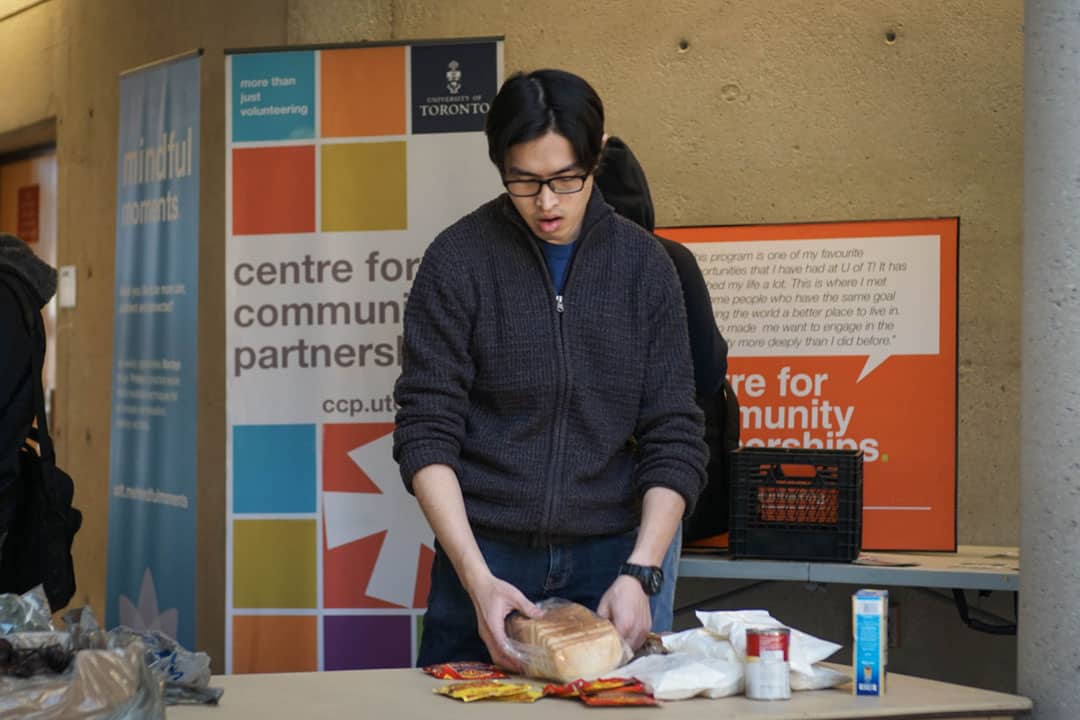Since 2001, the University of Toronto Students’ Union (UTSU) has provided a weekly service at UTSG for U of T students. The UTSU Food Bank aims to remedy food insecurity on campus for students who register and present a valid TCard and schedule. On average, the food bank serves 50 people per week.
Beginning September 2018, the food bank will move to the new Student Commons, where it will operate every weekday; it currently operates out of the Multi-Faith Centre every Friday of the year from 12:00–3:00 pm, except for Good Friday and the two weeks that the university is closed in December.
UTSU Services Coordinator Terri Nikolaevsky began working with the UTSU Food Bank in 2001 and has been involved in running it since. According to Nikolaevsky, yearly usage since the UTSU started managing the food bank has “been kind of similar over a long period of time.”
Support
The food bank relies primarily on food from the Daily Bread Food Bank and Second Harvest, two Ontario-based organizations that provide food for those in need. Both organizations sometimes face food shortages, especially during the winter months due to increased demand in Toronto.
To address this problem, Adrian Huntelar, the UTSU’s Chair of the Student Aid Committee and General Equity Director for Students in Poverty/Financial Insecurity, released an open letter in October to over 150 student clubs and 50 course unions, encouraging them to run food drives during their events in order to support the UTSU Food Bank.
“The response to the open letter has been amazing to watch,” said Huntelar. “Several clubs and course unions who run major annual events that attract large audiences have confirmed that they will be encouraging donations as part of their programming.”
The food bank receives donations and support from other sources around campus as well. For example, the Hart House Singers collect non-perishables at many of their concerts. The UTSU has also begun to request voluntary donations at some of its events.
Another example of the U of T community supporting the food bank is the Food for Fines program, which has been running since 2012. Through the charity drive, U of T libraries will waive $2 of library fines in exchange for a donation of a non-perishable food item, to a maximum of $20 waived. This year, the drive will run from November 20–24.
Huntelar has also been involved in discussions with two food-related organizations, FoodReach and Feedback, in order to secure healthier and affordable food to U of T students in the future and achieve greater food security beyond the food bank.
Beyond these initiatives, and certain departments occasionally running collection drives, the university administration does not provide direct funding or support for the UTSU Food Bank.
Challenges
Nikolaevsky said addressing dietary restrictions and providing healthy food are recurring challenges for the food bank. “We’re always trying to find ways to meet those needs of students and make sure that the hamper that we are able to distribute to them have… healthy food choices,” said Nikolaevsky. “Because we want to get the best, most nutritious food into the hands of the students.”
The food bank has four to six consistent volunteers per term. The Hunger Squad volunteer program allows students to get a CCR credit for volunteering.
Julia Devorak, the on-site supervisor of the food bank since August, said volunteer availability fluctuates. “Sometimes I can’t get anybody to come and it’s me and one other person and it can be a lot of work, but some weeks, like [reading] week, everybody wanted to come because everybody was available. It’s up and down.”
UTSU President Mathias Memmel said that “Terri [Nikolaevsky] does an incredible job of making everything work; there are no significant problems.”
Moving to the Student Commons
The food bank was started in the 1990s by U of T’s Women’s Centre. In 2001, the UTSU took over leadership, making the service available on a weekly basis throughout the year.
Next year, the food bank will find a permanent venue at the UTSU’s Student Commons, which is slated to open in September 2018. Although the UTSU has called for tighter financial management in light of the Student Commons’ projected $2.3 million deficit over 11 years, Memmel said such costs do not impact the food bank’s operation. “The Food Bank isn’t especially expensive as the food is donated to us from a number of external partners, so cost isn’t a major concern,” said Memmel.
As the food bank prepares for the move, Huntelar is working with other members of the UTSU Board of Directors and Executive Committee to secure proper storage space for fresh food. It is especially important for fruits, vegetables, dairy, and other perishable items to be available to students.
According to Devorak, “Having the space to accommodate [clients] and offering it on multiple days of the week could be helpful to students because not everybody can come on a Friday and people have needs on other days of the week.”
However, Devorak also noted that “in terms of logistics, [increased operation] could make it more difficult for sure. It can be hard for me to find people once a week — finding people five days a week? We’ll have to see.”


